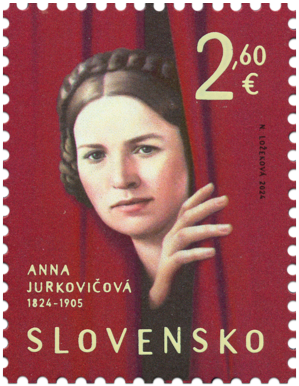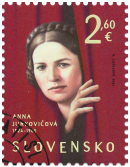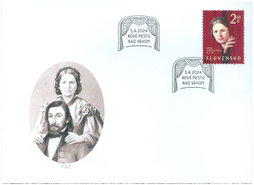814 Date of issue
05.04.2024 Face value
2.60 € Sell price
2.60 €
Anna Hurbanová, born Jurkovičová, was one of the first actresses in amateur theatre in Western Slovakia. She was the first woman who dared to appear on stage with Štúr’s students and take on a female character. Her determination and desire to do something for the nation also translated into her marriage to Jozef Miloslav Hurban, whom she selflessly supported in the national struggle.
Anička, as she was called, came from the family of a teacher, Samuel Jurkovič, who was also the organizer and founder of the first amateur theatre group in Sobotište, the Slovak National Theatre of Nitra. As the daughter of an intellectual, she was a knowledgeable, educated, and nationally aware young woman. She perceived the theatre as a means to spread the patriotic ideas instilled in her by her father. Through her performances in the amateur theatre group, she tried to dismantle social prejudices related to the role of women. Many criticised her for stepping on the stage, even her father was condemned for allowing her to do so. In fact, it was him and the students who encouraged her to play and called for her to participate in three productions. She made her debut in the single-act play Peter the Third’s Old Coachman by the German playwright August von Kotzebue in 1841, portraying the frail character of Anička Dobrožilová. It was the first ever production by the amateur theatre group. Following that, again in 1841, she took on a role in the single-act play The Magical Hat by the Czech author Václav Kliment Klicpera, playing the character Betuška. Her final performance, in 1842, was in the tragedy The Serfs, or Isidor and Olga by German dramatist Ernst Raupach, where she took on a more significant role as Oľga.
Anička became a muse for several members of Štúr’s generation, but in the end, she chose to follow her destiny alongside Jozef Miloslav Hurban. After their marriage, she no longer performed in the theatre but instead supported her husband, he became the first chairman of the Slovak National Council, a writer of significance and a politician. Together they had nine children, several of whom made notable contributions to the cultural history of Slovakia. Her personality and life story prompted several artists to immortalise her in novels and films.
In her honour, the Anička Jurkovičová Festival has been held in her birthplace since 1998 – a nationwide showcase of amateur theatre groups and ensembles that maps the role of women in society. Since 2002, as part of the festival, the Thalia Flower prize has been awarded to female artists who have made influential contributions to Slovak theatre.
Zuzana Poliščák Šnircová
Show less© 2024 POFIS - Postal philatelic service. All rights reserved








